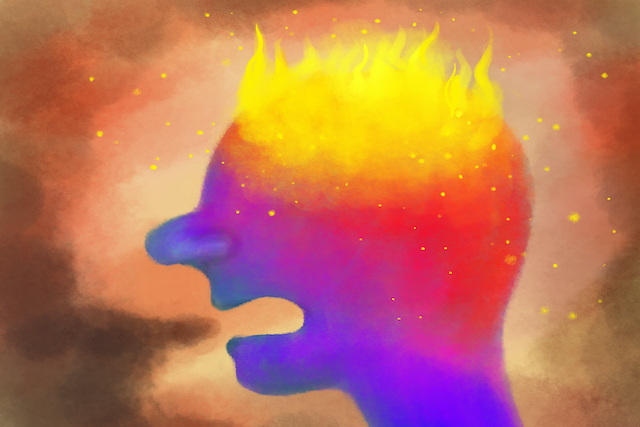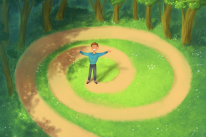
“Some people are in such utter darkness that they will burn you just to see a light. Try not to take it personally.” ~Kamand Kojouri
The saying goes that money makes the world go round, but of course that’s not true.
It’s our relationships.
How we relate to other people and how they relate to us keeps our world turning. When things go well, all’s right with our world. When things go badly, it can feel as though our world has ground to a halt.
This is exactly how I felt whenever I had a difficult experience with a loved one or friend.
Whenever they lashed out at me for no real reason, it felt as if I couldn’t move on again until their negativity or bad temper had blown over. Until that happened, I replayed the scenarios in my mind, trying to work out where I was to blame for their behavior, and feeling awful in the meantime.
That’s why our relationships will always be the most important thing in our lives—they have such a strong impact on us, both good and bad.
That is also why it serves us well to try to have the best possible relationship with others, as well as ourselves. That includes improving the connections we have with the difficult and less-than-positive people in our lives and strengthening our boundaries in the process.
We probably all have several negative people in our lives—those who criticize, complain, belittle us and other people, and say or do cruel things. They can be the closest to us, people we have known all our lives, and that makes their negativity harder to escape and endure.
I had a family member who was very negative about pretty much everything. Spending time in their company was usually a draining and disheartening experience due to their complaining and sniping comments.
This person made it very clear whenever I met them that they had little time or affection for me, which of course made family get-togethers less than enjoyable.
I was also puzzled as to why they were like that: we’d never argued, and I had never, to my knowledge, done or said anything mean to them. Yet, they still acted in a negative way toward me, especially if I mentioned affirmative life experiences such as a great holiday or a new exciting project.
Unsurprisingly, I responded to their negativity with a sense of apprehension, frustration, and confusion, which stopped me from enjoying the company of my other relatives. It also made me wary about fully expressing myself or talking about my life. And my uneasiness undoubtedly made the atmosphere between my family member and me even more negative.
We all Have Emotional Scars from the Past
I eventually recognized that I was hurt by my relative’s treatment in large part because I took it personally and allowed it to affect my self-image and self-esteem—as if I somehow deserved it. Then I realized something that changed everything for me.
We all have a self-image shaped in large part by other people. Family, friends, and partners, who’ve likely scarred us through anger, resentment, jealousy, judgment, neglect, or even outright abuse. And this affects how we show up in the world.
Everyone, including the people who have wronged you or been negative toward you in some way, has scars from their past too.
Maybe your critical mother doesn’t know any better because her mother was critical. Maybe your absent father never knew his father either. Maybe your backstabbing friend was jealous of you for reasons only known to them. Perhaps your cheating partner had abusive parents, and your partner sabotages relationships because they don’t believe anyone can love them.
Each and every one of us carries around our scars, going out into the world to meet other people who have scars, and when we connect, these combined scars can sometimes tear open.
We all See Ourselves Through Others’ Eyes
We all tend to see ourselves through our loved ones’ eyes—starting with our parents when we’re young—because we assume their perceptions of us are accurate and blame ourselves if they’re not flattering. Our self-image can alter based on their comments, emotions, and actions—positive and negative.
This is a classic case of our relationships shaping our sense of self, an ongoing shaping that begins even before we can fully understand the meanings of what other people say or do to us.
We are each the result of our experiences within our multiple relationships and interactions. How other people relate to us affects our image of ourselves, but that doesn’t mean we are helpless in the face of other people’s behavior toward us.
We may not have had much of a choice as a child, but it’s a different matter once we’re adults. With awareness, we’re now able to protect ourselves far better from others’ negativity toward us and set necessary boundaries.
Learning to Connect in a Different Way
If you’re dealing with a negative or painful relationship that leaves you feeling bad about yourself, you can of course choose to distance yourself from the person and limit contact. Sometimes, however, this isn’t possible, so you have to learn how to connect in a different way while safeguarding yourself from their negative impact on you.
I decided I had to respond differently to my family member and their negativity for the sake of my well-being. I began to look beyond their behavior and actions, and in doing so I started to piece together an idea of what might be the real cause of their pain and unhappiness.
I recalled they had often moaned about how much they hated their job, how they disliked the town they lived in and their neighbors, and they also often complained of tiredness and physical aches and pains.
I began to see that this person’s negativity—even if it was aimed at me, maybe due to their feelings of envy—wasn’t really about me. They were unhappy with their life in general. Negative people are often unhappy on many levels.
It also helped me to remember we all have emotional scars, as mentioned before. When you approach people from a place of understanding, compassion, and empathy, you no longer see them as cheats, liars, betrayers, or “bad” people out to get you—even though they might cheat, lie, or betray you. You instead begin to see beyond their behavior and recognize that they’re in pain.
When you do that a lot of their power over you starts to fade. You begin to see them as vulnerable, like everyone else. You start to realize that their negative actions toward you reflect far more on them than they do on you.
People often hurt each other because of their own deep pain and because they don’t know any other way to act. This is often a painful lesson to learn.
But when you finally grasp this difficult truth, you become more accepting of what happened, more forgiving, and ready to let go and move on. You realize you do not need to take on their negativity, brood about it, or feel you are the cause of it.
That doesn’t mean you have to condone or accept mistreatment. And that’s not to say people’s negativity toward you won’t bother or hurt you ever again, but the effect won’t be so intense. You’ll realize that the situation isn’t really about you at all. Any pain they try to inflict on you is simply a reflection of what they feel inside; it no longer feels so personal.
When I stopped taking my relative’s negativity personally, I was able to interact with them in a different way. I was much more relaxed in their company and able to enjoy family gatherings much more.
When you stop taking other people’s negativity personally, you cease to be so susceptible to creating your self-image through their eyes. In fact, you start to focus far more on how you view them.
Then you’re also free to focus less on their negativity and bad behavior and more on how you respond to it. That might mean setting boundaries and limiting your contact with them, and that’s okay. Sometimes you have to understand and empathize from afar to take good care of yourself.
We’re All in the Same “Life” Boat
Essentially, we’re all in the same “life” boat, bobbing up and down on the vast ocean of existence.
We are all fallible. We all inflict hurt on others, intentionally and unintentionally.
We all experience negative situations and inevitable suffering, and we simply have to accept this. Without pain and suffering we might not value joy or experience spiritual growth. If we never experienced adversity, we might not appreciate our strength.
And without negative people we might not be truly grateful for or cherish the loving, supportive people we have in our lives.
About KJ Hutchings
KJ Hutchings is a fiction and self-help writer and artist. Visit her site kjhutchings.com to get 25% off any artwork in her online shop, free fiction and regular updates. You can also find her on Facebook and Instagram.
- Web |
- More Posts













 Though I run this site, it is not mine. It's ours. It's not about me. It's about us. Your stories and your wisdom are just as meaningful as mine.
Though I run this site, it is not mine. It's ours. It's not about me. It's about us. Your stories and your wisdom are just as meaningful as mine.
Thanks for sharing your thoughts KJ! It was a great reminder.
Sometimes I find it can be easier to handle other peoples criticism, than to handle my own. Though the same lessons still apply!
It took me a long time to understand the deep impact verbal abuse has on the way we treat ourselves.
It is difficult to protect ourselves against something we actually believe. The process of changing our beliefs and accepting that we deserve better is a journey I highly recommend.
Thank you for your comments Helena. You are right that we are sometimes our worst critics. It can be a long process to change that bad habit but as you say, it’s a very worthwhile journey.
I can now understand my younger brother’s negative attitude towards me, he’s filled with nothing but hate and anger towards me where as I’ve never done anything to mistreat him to the contrary when we were younger he took my car totalled it and left me without a car, he never said he was sorry my parents didn’t enforce any punishment. The majority of my siblings behave the same way I’ve always stayed away from them they still find a way to push my buttons. Great article
Thanks for your comment Marcella – I’m sorry to hear you’ve had to deal with so much negativity from others. I’m glad you found the article helpful and that it’s given you some clarity about your relationships with your siblings.
Thank you for reading the article, Ahimsa42, and for your comments.
Like a Russian doll, boats within boats, within boats. It is the ‘distance’ from which one chooses to look that one may view, or not view, everyone within the same boat.
Like the author one of the boats within boats that I find myself in, is one in which I have been proven fallible and inflicted hurt on others, intentionally and unintentional. I can’t think of any soul I’ve met that was not in that boat and who also have not suffered in some way. True some suffer more then others, a boat within a boat. A realization perhaps necessary to move towards compassion and healthy boundaries?
Is it a unfounded optimism or realistic view, that we all fall short?
Hi Helena,
How did you see a comment was marked as spam? I didn’t do that on my end. I have no idea what’s going on with Disqus! I don’t even see the first reply pending on the backend…
Lori
It showed a message on screen in place of my comment that it was marked as spam after I posted. Don’t worry about it Lori, I didn’t think it was you. It seemed automatic, Disqus is buggy sometimes. Thanks for your concern though!
I beg to differ with your supposition that health and disease is due to lifestyle choices.
Yes, there are lifestyle choices people can make to manage conditions.
But without health care humans die during childbirth, children die of disease and ultimately our lifespan natural lifespan is about 30 years. Modern medicine extends our lifespan considerably. It makes complete sense that an extended lifespan can come with health issues.
You are victimising yourself and blaming others for natural understandable health issues.
Myself, (ignoring the benefits I received due to healthcare at birth and due to vaccination during childhood) my lifespan was extended by modern medicine since my mid-late 20s. I manage my health by making healthy lifestyle choices but I would be unable to walk and slowly die without daily medication.
You don’t seem to understand how people can be positive when they accept their difficulties in life. There are two ways to look at difficulties experienced in life.
Either try your hardest no matter how long it takes, how difficult it is or how impossible it seems, or give up. Personally, I’d rather not wallow in a pit of depression.
You should be aware that in many studies which measure attractiveness, height often doesn’t impact outcomes or mean that men are rated as less attractive. Also, height doesn’t vary the number of sexual partners reported by men.
1 in 4 men experience hair-loss in their early 20s. Whilst male pattern baldness does negatively impact attractiveness, being fully bald or shaven does not.
Additionally, whilst a lack of perceived attractiveness decreases the number of short term relationships, it doesn’t change the number of long term relationships experienced by men.
Ironically, having no previous sexual partners does decrease perceived attractiveness.
Attractiveness is the main criteria in selecting a partner for women between the ages of 18 and 25. After that resources are considered the main criteria for women selecting partners.
Perhaps it’s time to recognise that blaming your height and hair loss for your lack of dating life is a lie which only deepens your depression.
The only truth is that you are depressed, you haven’t dated in a number of years and you don’t really understand why. Perhaps a therapist can help you get to the bottom of this.
On a more positive note, research shows that only 1 to 2% of people have not had a sexual partner by the time they reach their 40s. The chances are 98 or 99 in 100 that you will find a partner by the time you hit 40 unless you choose to no longer pursue that interest.
Other statistics of interest might be that 1 in 8 people are virgins at the age of 26. And that 90% of those that lose their virginity before age 26 actually lose their virginity by the age of 19.
My first reply didn’t post and my second was marked as spam.
Ah, that makes sense! Thanks for the info.
I think lengthy responses are at risk of not posting sadly. Which is sad because it can be nice to have a deep conversation.
Hello, I am Shubhra Mohanty, a motivational speaker.
We are all in the same “life” boat, only we are all sailing in different oceans. I once read this somewhere while growing up: If someone gets a gift for you and you do not accept it, it remains with that person. Same is with words. Someone says something harsh, I choose not to take it.
Our coping mechanisms to heal our emotional scars are different. But the bottom line is the same. Without pain, we can never enjoy our spiritual growth. Indeed!
I loved your writing. Take my love.
Thank you so much for your comments Shubhra, and your blessings. I love the analogy you use for not accepting harsh words from someone – I will definitely remember that! It’s so true that “negative” experiences can serve our spiritual growth, if we let them. And none of us can escape pain, no matter which “life” boat we are sitting in.